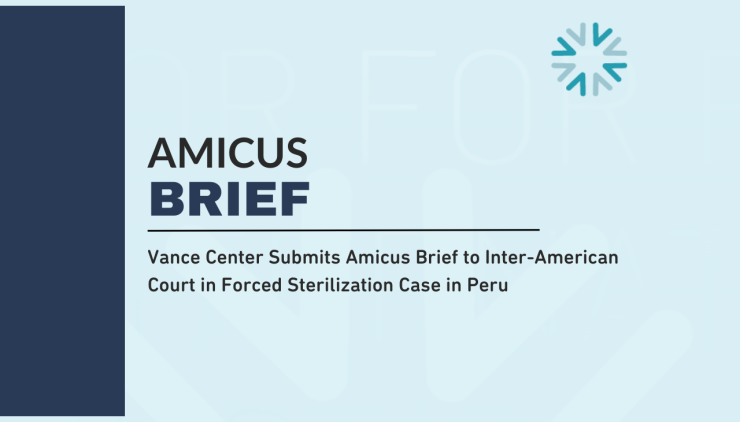This website uses cookies so that we can provide you with the best user experience possible. Cookie information is stored in your browser and performs functions such as recognising you when you return to our website and helping our team to understand which sections of the website you find most interesting and useful.
Vance Center Submits Amicus Brief to Inter-American Court in Forced Sterilization Case in Peru
June 2025The amicus brief argues that Peru's forced sterilization of Celia Edith Ramos Durand violated her right to free, prior, and informed consent.

On June 4, 2025, the Cyrus R. Vance Center for International Justice of the New York City Bar Association, along with counsel Milbank LLP, filed an amicus curiae brief to the Inter-American Court of Human Rights for the case Ramos Durand y otros v. Peru.
The amicus brief argues that the forced sterilization of Celia Edith Ramos Durand violated her right to free, prior, and informed consent, and urges the Court to uphold its jurisprudence on reproductive rights and state accountability and find in favor of Ramos Durand and her family.
Background
The case concerns a Peruvian woman, Celia Edith Ramos Durand, who underwent a forced sterilization procedure under Peru’s National Program for Reproductive Health and Family Planning (PNSRPF) in 1997. Ramos Durand suffered medical complications from the tubal ligation procedure conducted on July 3, 1997, that resulted in her death on July 24. Ramos Durand was one of an estimated 300,000 Peruvian women who underwent forced sterilization procedures without their informed consent as part of a national health policy.
Ramos Durand’s family filed a criminal complaint after her death, but the case was dismissed in 1997 after her death was deemed accidental. The investigation was subsequently reopened and archived on several occasions — when it was reopened in 2011, it implicated high-level government officials, including former President Alberto Fujimori, in systematic human rights abuses. Peruvian courts dismissed the case again in 2016.
The Inter-American Commission on Human Rights (IACHR) found that the PNSRPF established discriminatory goals exclusively targeting women, especially those living in poverty or from Indigenous communities, which reinforced gender stereotypes and affected women’s sexual and reproductive healthcare and rights. The Commission also found that in Ramos Durand’s case, the requirements and conditions necessary for her consent to be free and informed were not met.
On June 3, 2023, the IACHR submitted Ramos Durand v. Peru (case 13.752) to the Inter-American Court of Human Rights.
Conclusions
The amicus curiae brief filed by the Vance Center and Milbank LLP argues that Peru violated Celia Edith Ramos Durand’s rights under the American Convention on Human Rights by pressuring her into the irreversible procedure without proper informed consent, despite her repeated refusals.
The brief, coordinated by the Vance Center’s Human Rights & Access to Justice Program, finds that Ramos Durand could not have consented to a tubal ligation in a free, voluntary, and autonomous manner, and notes that medical providers never obtained Ramos Durand’s full and informed consent. Providers “failed to provide her with adequate information about tubal ligation, its risks, and other methods of contraception or give her sufficient time to consider the expected benefits and risks of the proposed irreversible — and, in her case, fatal — procedure.”
Drawing on international precedents and the Court’s previous decision in I.V. v. Bolivia, the brief emphasizes that the lack of free, prior, and informed consent constitutes a serious human rights violation, particularly given Peru’s systematic targeting of poor and Indigenous women.
The brief surveys informed consent standards under regional and international law as they relate to the rights to sexual and reproductive health, as well as when applied to other fundamental rights, such as the rights to information, health, liberty and security of person, freedom from cruel, inhuman, and degrading treatment, non-discrimination and equality, and privacy.
“Even if the Court were to find that Ms. Ramos Durand knowingly agreed to undergo a tubal ligation, it should conclude that medical providers failed to meet applicable standards on free and informed consent, vitiating any agreement that they may have received from Ms. Ramos Durand, and rendering her sterilization forced,” the brief states. “Consequently, Peru’s actions deprived Ms. Ramos Durand and her family of their rights under the American Convention on Human Rights.”
The Vance Center urges the Court to uphold its jurisprudence on reproductive rights and state accountability, particularly in cases involving systemic and discriminatory practices against marginalized women.
See the full amicus brief here.
The brief is also available in Spanish.


